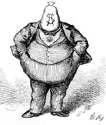Problems of Incorporation
The People's Party failed for several reasons, and its inability to account for the new corporate nature of the U.S. and of the political system contributed strongly to its demise.
Trachtenberg argues in his book that a new type of America based on incorporation formed during the Gilded Age. The People's Party failed to respond properly to this change on several levels. First, and perhaps most importantly, they could not reach the growing urban centers of the country. The support for the party came mainly from traditional anti-urban areas such as the "Deep South and the trans-Mississippi West," and the party failed to reach industrial workers (Kazin 42-43). In 1896, McKinley defeated Bryan largely because he won these urban votes. As one scholar notes, William Jennings Bryan (the 1896 presidential nominee of both the People's and the Democratic Parties) "could not convince urbanites and industrial workers that he understood their concerns" (McMath 203). The members of the People's Party failed to recognize the changing nature and division of the U.S. labor force. They continued to assert their ties with farmers and independent artisans while failing to acknowledge (and close) the distance between these people and the new fleet of urban workers. We see the confusion in a comment made by presidential candidate James Weaver in 1892: "It is a fight between labor and capital, and labor is in the vast majority" (Hofstadter 165). Weaver points out his opposition (capital) clearly enough, but he fails to understand the meaning of modern "labor." Although the People's Party fought for new rights for all workers, such as the shorter work-day, their campaign focused on rural needs. This type of platform would not necessarily appeal to an urban worker who saw himself removed from the agrarianism of America's past. America was becoming incorporated, and the People's Party neglected to work themselves into this change.
Hofstadter argues that this problem stems from an antiquated linking of democracy with farming. To the populists and agrarians, farming was seen as "sacrosanct." The roots of freedom could be found in working the soil, and what came from the land must be democratic. He writes:
|
A certain complacency and self-righteousness thus entered into rural thinking, and this complacency was rudely shocked by the conquests of industrialism. A good deal of the strain and the sense of anxiety in Populism results from this rapid decline of rural America (7). |
The Populist movement, then, responded not so much within a new incorporated society, but as a reaction against it. In doing so, the populists cut themselves apart from the means of change.
Trachtenberg argues, furthermore, that the two major parties themselves had been incorporated into American culture. The change comes about in large part when parties begin to rely on voter loyalty rather than on appealing to these voters through substantial issues (Trachtenberg 166). At this point, the parties began to be corporate machines, and Trachtenberg points to the rise of the professional politician as symptomatic of this transition (168). The parties, through various campaign appeals, secret maneuvering, outright fraud, and vote buying, worked to maintain their voter base and party strength without promoting issues. The major parties began to focus on cultural, rather than ideological differences, making people feel that contributing to a certain party constituted political strength while preventing the people from seeing their own alienation from ideology (Trachtenberg 172-3). This system, Trachtenberg suggests, worked towards "further integrating the daily lives of Americans into the larger corporate system (173).

We see in this transition the new basic function of the two major parties: the maintenance of the status quo. Any system works (exists even) to maintain itself, and with the increasing incorporatization of the two-party system this idea became more and more evident. Parties still worked for their constituents, but insofar as the parties needed to maintain this base for continued existence. The professionalization of politics represents a shift away from ideologies of social advancement towards self-promotion and the resulting stagnation. As third parties approach the political scene, they do so with the idea of changing the system. However, without being in the system, they do not have the machinations to effectively change things. They must either integrate or remain irrelevant (see more on this in the next section).
The major parties, however, could not utterly ignore the third party movements. To keep them at bay, the major parties had to subsume some third-party ideology--at least enough to swing votes their way, and keep reformers from achieving success. Ultimately, the People's Party recognized this fact, and felt their only chance for survival was to integrate themselves somewhat into the Democratic Party. Making free-silver its primary issue, the People's Party nominated the Democrat Bryan as its presidential candidate in 1896, hoping to gain some power through the system. However, when Bryan failed to win the election, the People's Party had disintegrated enough over the fusion to cease.
| Home | Introduction | Background | Major Party Incorporations | Internal Problems | Aftermath | Annotated Bibliography |